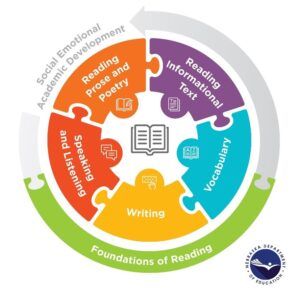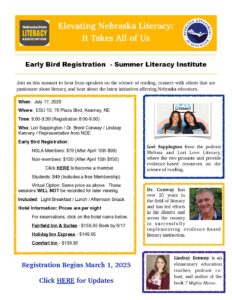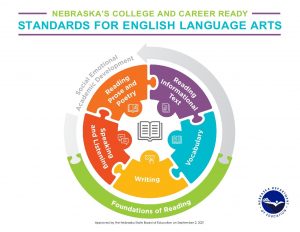Nebraska’s PK-12 students have equitable access to high-quality literacy instruction that prepares them for the demands of college, career, and civic life. Instructional practices are grounded in student engagement with complex and challenging texts and are responsive to a range of student needs and interests.
We Believe
- Excellent literacy instruction provides opportunities for all students to learn, regardless of their race, ethnicity, or any other part of their identity;
- A clear, required sequence of foundational skills is important and necessary to developing proficient readers who have the capacity to comprehend a variety of texts across disciplines;
- Every Nebraska student deserves access to high-quality, culturally responsive instructional materials that are aligned to state standards and instructional shifts;
- Deep engagement with rich, worthwhile texts and tasks builds students’ knowledge of the world;
- Providing frequent and meaningful opportunities to write about text is an effective practice that helps students develop the ability to think critically about the content and ideas presented in all disciplines;
- Content-area and disciplinary literacy are essential components of college, career, and civic readiness; and systematic vocabulary instruction in all content areas, across all grade levels, plays a critical role in successful reading comprehension.
Foundational Literacy
The Nebraska State Board of Education supports and encourages systemic efforts to improve foundational literacy, working to ensure that all students become successful readers and writers. The Nebraska State Board of Education believes that all schools should establish policies that promote high-quality early literacy instruction that is grounded in evidence-based practices and that highlights the importance of grade- level reading. Foundational literacy instruction is essential to ensure all children become successful readers and writers. All students, including students with disabilities, English learners, and high-ability learners should have access to high-quality instructional materials and instruction.
News & Notes
NSLA Summer Literacy Institute – July 17, 2025
Elevating Nebraska Literacy
Join us this summer to hear from speakers on the science of reading, connect with others that are passionate about literacy, and hear about the latest initiatives affecting Nebraska educators.
Support for Adolescent Literacy provided by The Reading League
Adolescent students often struggle with reading due to a combination of underlying factors, including inadequate foundational literacy skills, limited vocabulary, and insufficient exposure to complex texts. Some of these students missed out on crucial early reading instruction, leading to persistent gaps in their phonemic awareness, phonics, fluency, vocabulary, comprehension, and writing. Socioeconomic disparities and a lack of access to high-quality reading materials can exacerbate these challenges. As adolescents progress through grades without these skills, engaging with grade-level content for academic success and everyday life becomes increasingly difficult.
Curriculum Review Workbook by The Reading League
The curriculum adoption process may be a challenging task to complete if you don’t have a reliable resource to assist the actions. The Curriculum Review Workbook simplifies that process by aligning scientific evidence in an easy to understand guidance document (you will need to request access to this Google doc)! Please check it out!
Foundational Literacy Instructional Routines Webinar Series
The NDE, in partnership with the NeMTSS, is thrilled to announce the release of a 23-episode series dedicated to enhancing literacy and comprehension routines. It is based on the Foundational Literacy Instructional Routines document. This comprehensive series aims to provide educators with a deeper understanding of various reading models, their instructional implications, and practical strategies for implementing effective literacy routines in the classroom. Viewers will gain valuable insights into step-by-step guides on how to improve literacy and comprehension practices, ensuring a strong foundation for their students. The links to the episodes are updated on the Foundational Literacy Instructional Routines page and available on the NeMTSS website.








